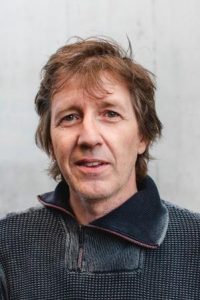Swiss German PEN: Raising Awareness for Lesser-Known Cases

The PEN World series showcases the important work of the more than 140 centers that form PEN International. Each PEN center sets its own priorities, but they are united by their commitment to advocate for imperiled writers, promote literature from all cultures and in all languages, and advance the right of every individual to speak freely.
In this series, PEN America interviews the leaders of different PEN centers from the global network to offer a window into the literary accomplishments and free expression challenges of their respective countries. This month we spoke with Adi Blum from the Swiss German PEN Center.
What is a project that you have been working on in recent months?
There was the annual general assembly, where we always partner with the major festival Solothurner Literaturtage. Solothurn is a nice medieval city in the center of Switzerland, and the name of the festival translates to “The Literary Days of Solouthurn.” It’s the most important literary festival in Switzerland, and we always have our general assembly there, but this year an especially vocal contributor was Turkey, given the recent issues there relevant to PEN’s initiatives. This festival was a huge project we took on recently, but at the same time we were also working with our first scholarship holder, Daniel Mekonnen, a human rights practitioner and scholar from Eritrea, who has been working and studying in Switzerland for a year and a half. It’s currently the end of his term and now we’ve got to figure out how to end his scholarship experience the right way. Some big questions that have come up have to do with whether he can stay in Switzerland once he’s done with our scholarship school or whether he’ll have to relocate elsewhere.
What are the key free expression challenges facing your region, and what kind of work have you been doing to overcome them?
Switzerland is in the very center of Europe, and, within our borders, we don’t have many writers in prison for expressing their own thoughts. So, our main goal is promoting free speech. We’re also a very small PEN center, so we have to concentrate on a narrow range of topics. For the last five years, one of those topics was addressing the issues concerning free speech in Turkey, where there’s room for plenty of action to be taken. Fortunately, our newspapers are very much on the same page as us with this initiative, so our job really centers on being the first to pass on information to the U.S. papers so that they can further circulate that information. Our work doesn’t only deal with the more mainstream cases like that of Asli Erdoğan. There are so many other names that should be mentioned, and we try to spread awareness about those less spoken about cases. We also have honorary members, and they try to get some attention by doing other free speech advocacy work alongside the Writers in Exile Program.
Would you share with us a sense of the literary traditions in your region?
Something very interesting that’s on its way to becoming a tradition in Switzerland is spoken word. We’ve long had the literary tradition of writing books and holding lectures, but in Lucerne, there’s now a festival taking place every other year that invites people to perform spoken word on stage. It’s called “woerdz.” I think this is a very positive tradition because, in practice, it almost mirrors political speech. These performers are also working for the stage, not just the page, and often, it feels so direct and political that one begins to notice how the literary is almost always inherently political. We invited people from Kosovo to read their poems, which is its own type of literature, but we’re really trying to cultivate this spoken word trend, which I think is a really interesting direction that the future of literature everywhere is headed.
…and update us on something new in the literary world of your region today?
I guess I spoke of something new when I was supposed to speak on an older tradition, but I suppose spoken literature came before all other types, so we’re, in a way, going back to get to the future!
Who is a writer from your region that we might not know about? Would you introduce us?
I don’t like to pick favorites, but I did mention Daniel Mekonnen earlier, who is our scholarship holder. He’s a human rights activist and lawyer, but, at the same time, he is writing poems and is going to have them translated. I’d love for anyone who reads this to follow his literary path going forward!






